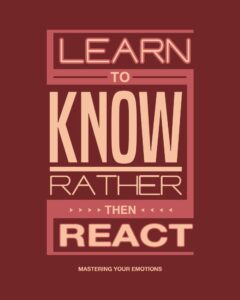What is emotional wisdom?
Here’s what I think… and I’m no Webster.
Emotional wisdom is taking an appropriate action or making a decision based on past actions and even past mistakes. When you learn from past mistakes and take that knowledge and experience with you into the future… that my dear is emotional wisdom.
Our emotions are continually giving us messages about what feels good and what doesn’t, what feels right and what feels wrong, what is acceptable and what isn’t, and the ultimate direction we should be going. Our emotions tell us when things are great, or when they need to be improved.
Being a caregiver to my mom with dementia, tests my emotions not only day to day but sometimes minute by minute. It’s easy to forget to call on your wisdom in the heat of the moment. But we try. Here are 4 ideas to remember to help you achieve the emotional wisdom you’ll need to rely on in the moment.
Listen – A huge part of developing emotional wisdom is in learning how to listen and interpret the experiences we have. By listening to your emotions, you can gain a wide understanding of what’s going on inside you. What’s going on inside you can affect your physical health and mental well-being, so it pays to listen carefully. Doing so will help you manage stress, which can manifest itself in many negative emotions.
2.Trust – Trust in your ability to feel and be felt, to interpret your emotions accurately. Trust that you can handle whatever emotions come your way – after all, you’re still here, aren’t you? We’re all much more capable than we tend to give ourselves credit for, so while you listen to your emotions, trust that what you’re hearing is the truth. Never second guess yourself when it comes to feeling. Whatever it is you’re feeling is valid and worthy.
3.Reflect – Your ability to look at your emotions realistically in relation to the situations they arise is important in developing your emotional wisdom. Notice I said reflect – not react. There’s a difference. As you’re listening to your emotions, examine whether they match the situation that it came from. Often, we are used to telling ourselves stories regarding our emotions that simply aren’t true – they’re just habits. Therefore, honest reflection is a truly valuable skill to possess.
4.Adjust – The ability to adjust your emotion to your present situation is a sign of true emotional wisdom. Like anything, this takes practice, but when you learn to properly interpret the messages your emotions send you, you can adjust, as you feel necessary.
I learned the importance of being able to adjust my emotions because being a caregiver to a person with dementia; I have to adjust… because she can’t.
So what have we learned? True emotional wisdom comes from looking within and listening carefully to what we feel to give us clues that help us live healthier, happier, more productive lives for ourselves and for those we care for.
